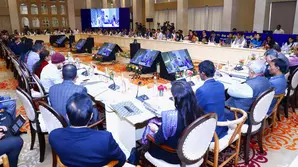GST recommendations to create business-friendly environment, ensure fairness: Experts

New Delhi, Dec 22 The 55th GST Council meeting has unveiled a series of pivotal recommendations designed to deliver targeted relief, streamline compliance processes, resolve industry ambiguities and promote trade facilitation, experts said on Sunday.
Among the key proposals is a retrospective amendment to the blocked credit provisions, which now replaces the term “plant or machinery” with “plant and machinery” in line with the Supreme Court’s ruling in the Safari Retreats case.
“This distinction clarifies the eligibility for Input Tax Credit (ITC) based on the usage of the two terms. Furthermore, the amendment to the Input Service Distributor (ISD) provisions will incorporate inter-state reverse charge mechanism (RCM) transactions, providing much-needed clarity within the ISD framework,” said Krishan Arora, Partner, Grant Thornton Bharat.
Addressing long-standing uncertainties, the Council has clarified that vouchers are neither to be classified as goods nor services. Similarly, goods stored in a Special Economic Zone (SEZ) or Free Trade and Warehousing Zone (FTWZ) prior to export clearance or supply to the Domestic Tariff Area (DTA) will not be considered as a supply of goods or services, aligning the treatment of SEZ/FTWZ and customs bonded warehouses.
In a bid to enhance accessibility to appellate mechanisms without undue financial burden, the Council has also proposed reducing the pre-deposit requirement from 25 per cent to 10 per cent, specifically in cases involving penalties.
“Additionally, the introduction of a track and trace mechanism for commodities prone to evasion signals a significant step toward bolstering transparency within the GST regime,” said Arora.
Other noteworthy recommendations include a reduction in the GST rate on fortified rice kernels to 5 per cent, and the full exemption of gene therapy from GST, making essential goods and advanced medical treatments more affordable.
“The exemption on gene therapy for life-saving measures is welcome since the costs associated with such therapy are significant and sometimes out of reach of the person, who needs it. The GST exemption would bring it within reach of more people,” said Gyanendra Tripathi, Partner and Leader (West), Indirect Tax, BDO India.
The clarification that no GST is applicable to penal charges levied by banks and Non-Banking Financial Companies (NBFCs) for non-compliance with loan terms will ease the financial burden on borrowers.
Similarly, the exemption of GST on contributions made by general insurance companies to the Motor Vehicle Accident Fund is expected to lead to lower motor insurance premiums, benefitting vehicle owners.
According to Tripathi, a concept note to simplify the process of GST registration for small assessees is again a welcome step since there is variance in the documentation requirements for registrations in different locations and it is hoped that the registration process is uniformly prescribed, for smaller as well as large assessees.
Collectively, these measures underscore the Council’s commitment to fostering a more business-friendly environment, ensuring fairness, and enhancing clarity within the GST framework, experts noted.
—IANS
na/
Source: IANS